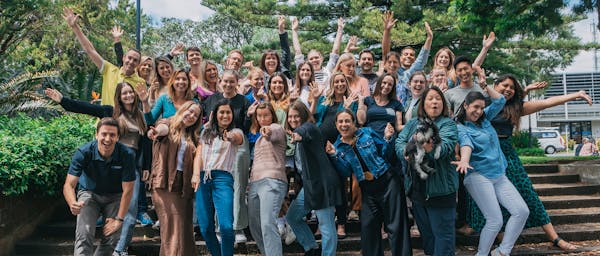Do not allow yourself to fear the unknown. Embrace the mystery and wonder. Some people say “we’ll cross that bridge when we come to it” and it’s the perfect reminder to just be in the moment.
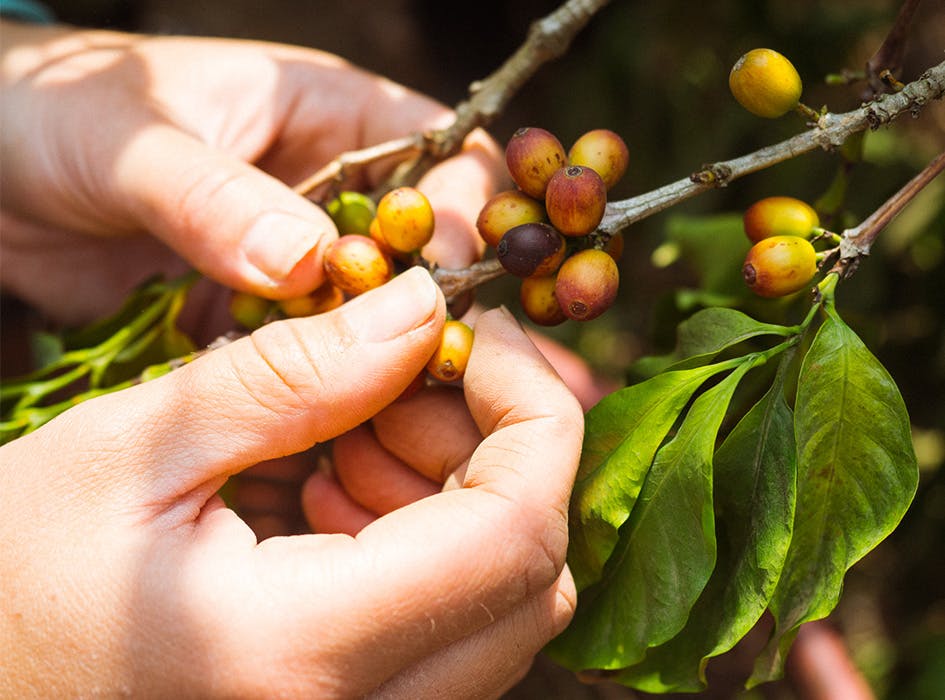
Eco-Agriculture Conservation Volunteer Project in Costa Rica
Purpose
Start dates
Duration
Volunteer hours
Age
Accommodation
Who is going?
Group video calls
Once you have secured your place, join regular video calls to meet your Program Manager and other volunteers before your trip.
This program is ideal for:
Active volunteers who are interested in coffee production, sustainability and are willing to lend a hand with whatever tasks are required at the time.
Project details
Love coffee and want to do Eco-Agriculture volunteering in Costa Rica’s Central Highlands? International Volunteer HQ’s Eco-Agriculture Conservation project gives volunteers the unique opportunity to learn about Costa Rica’s world-famous coffee industry first-hand. Volunteers work alongside a local coffee farming family to help improve the local harvest and implement sustainable, effective agricultural practices while also respecting local farming methods.
What to expect and how you'll make an impact
Coffee beans from Costa Rica are recognised as being some of the best in the world and coffee has been a major industry and export for the country since the early 1800s. Past coffee farming practices led to large-scale deforestation and pollution of rivers and have now been outlawed by the Costa Rican government in a move towards a greener future.
The Eco-Agriculture Conservation project is an immersive permaculture experience where you’ll have a hands-on role in supporting a coffee farming family with all stages of production. Volunteers can help implement sustainable, effective practices that help regenerate the environment and combat climate change while also respecting local farming methods.
As an Eco-Agriculture volunteer you’ll need to help out wherever you’re needed and duties will changed depending on the season, but often tasks include:
- Harvesting coffee beans
- Roasting and packaging coffee beans
- Composting
- Replanting
- Clearing grounds for planting
Please note, there is a minimum duration requirement of 2 weeks for this project.
Why do Eco-Agriculture Conservation volunteering in San Jose with IVHQ?
When you volunteer on a coffee farm in the Central Highlands of Costa Rica you’ll be adding value to the local community, while also developing personally and professionally by:
- Supporting sustainable farming practices
- Learning about coffee production
- Practicing your Spanish and helping locals to learn English
- Developing your communication skills
- Gaining farming experience
- Immersing yourself fully in the Costa Rican culture
- Discovering the natural beauty of Costa Rica’s Central Highlands
Volunteer requirements
- Volunteers under the age of 18 must be accompanied by a parent or guardian to participate in this program
- All volunteers aged 18+ are required to provide a criminal background check to IVHQ prior to departure.
- All volunteers are required to have adequate volunteer travel insurance
- All volunteers must speak fluent English.
Are you eligible to volunteer?
Submit a free application so we can confirm your eligibility and check availability for your preferred dates.
Not sure which program to join?
Get personalized recommendations >
Who is going?
Group video calls
Once you have secured your place, join regular video calls to meet your Program Manager and other volunteers before your trip.
Costa Rica photo gallery










































































Academic course credit

Academic course credit
Gain course credit from your college or university and meet your academic requirements when completing a volunteer abroad program with International Volunteer HQ!
Learn about course creditLocation

Location
IVHQ’s Eco-Agriculture Conservation project is based in the Central Highlands of Costa Rica about four hours from the capital city of San José. The rural area is full of coffee plantations, forests, volcanoes and other natural wonders which make a stunning backdrop for volunteer work and offer many opportunities for adventure.
Arrival and orientation
After you have registered for the program, please book your flights to arrive at Juan Santamaria International Airport (SJO) in San José on the Sunday before your start date. When you arrive, you will be greeted at the airport by a member of the local team and taken to the volunteer accommodation in San José. This is included in your Program Fee.
As Eco-Agriculture volunteers you will stay in San Jose on your first night and then take a bus to your placement location; this is included in the Program Fee (as is your return to the local team’s office in San Jose at the conclusion of the program).
If you are travelling in Costa Rica prior to your program, you can meet the local team in San José on the Sunday before your program starts.
Orientation will be held in San José and covers everything you need to know for your volunteer program in Costa Rica – an introduction to Costa Rica, its customs, language training details, rules and expectations, safety, travel opportunities in Costa Rica, and an introduction to your project and placement. The orientation will also give you a chance to meet other volunteers and swap contact details for weekend travel and socialising.
Volunteer schedule example
Weekdays - A typical schedule might look like this:
| 7:00 AM | Breakfast with your host family and walk to the project site. |
| 9:00 AM | Volunteer work begins. Depending on the season you may be picking or roasting coffee beans, digging and preparing the farm for planting, or working with farm animals. |
| 12:00 PM | Lunch and a long break. |
| 3:00 PM | Continue volunteer work. |
| 6:00 PM | Volunteer work ends. Get driven back to your host family for dinner. |
Weekends
Volunteers on the Eco-Agriculture Conservation project have weekends off to explore the area or relax. The more rural nature of these placements mean there are fewer city conveniences and entertainment options. Instead you can visit Costa Rica’s cloud forests where you might find thousands of different kinds of wildlife and several hundred species of birds and plants, hike up Costa Rica’s tallest mountains, see a plethora of breath-taking waterfalls or enjoy the authentic charm of smaller towns and villages.
Accommodation and WiFi
You’ll get to experience a true cultural immersion experience in a homestay hosted by a local farming family. Conditions in these remote locations are basic but comfortable. Bed linen is provided but you will need to bring your own towel and toiletries. You can typically expect to share a bedroom with 2 - 4 other volunteers of the same gender. Washrooms are shared by all volunteers, and have flush toilets and cold water showers. Due to the tropical environment you can also expect a variety of critters (insects, spiders, etc.) to be present.
WiFi is unavailable at the Eco-Agriculture Conservation site, so we recommend purchasing a local SIM card for an unlocked mobile phone during your program orientation in San José if you want to keep connected.
Meals
Volunteers on the Eco-Agriculture Conservation project are served three meals a day. These will be mainly traditional Costa Rican style dishes and light vegetarian meals like:
- Rice, beans and plantains are common
- Eggs, toast, cereal
- Fruit and vegetables on occasion
- Gallo pinto, casado and fried cheese are common traditional dishes
Breakfast can include toast, cereal and eggs. Tea, coffee, and toast will be available throughout the day. Purified drinking water is also available; we do not recommend that you drink the tap water unless it has been boiled.
If you have special dietary requirements, please let us when you apply so that we can make arrangements for you. However, you should not expect to eat as you normally do at home and need to be as flexible as possible. We will do our best to see that you are well taken care of.























Pricing
Spots are limited. For a Registration Fee of just US$299 (approximately AU$489) you secure your spot and unlock all our preparation and training tools.
You don't need to worry about paying your Program Fee until you get closer to your start date.
Duration |
Program FeeDue 30 days before you start, or within 48 hours if you register inside of 30 days. Covers the cost of hosting you.
|
|---|---|
| 2 weeks | $1,045 Equivalent to $75/day |
| 3 weeks | $1,450 Equivalent to $69/day |
| 4 weeks | $1,810 Equivalent to $65/day |
| 5 weeks | $2,120 Equivalent to $61/day |
| 6 weeks | $2,430 Equivalent to $58/day |
| 8 weeks | $3,050 Equivalent to $54/day |
| 10 weeks | $3,670 Equivalent to $52/day |
| 12 weeks | $4,290 Equivalent to $51/day |
| 16 weeks | $5,530 Equivalent to $49/day |
| 20 weeks | $6,770 Equivalent to $48/day |
| 24 weeks | $8,010 Equivalent to $48/day |
- All programs attract a Registration Fee of US$299 (approximately AU$489) in addition to the Program Fee. This covers all pre-departure support services.
- A 5% international banking fee is added at point of payment.
- Recommended spending money: Volunteers in the Eco-Agriculture Conservation in Costa Rica generally find US$100 - US$150 per week to be sufficient for expenses.
- Breakfast, lunch and dinner
- Airport pick-up
- Transportation from San Jose - Project Location - San Jose
- US$95 per week for materials and logistics involved in the project
- Accommodation
- 24/7 in-country emergency support
- In-country program orientation
- Pre-departure support from your Program Manager
- Personalised preparation tools, guides and check lists
- Access to IVHQ’s preferred insurance and flights partners
- Comprehensive in-country day to day support and guidance
- Discounts on language lessons
- Discounts on travel and tour add-ons
- Certificate of International Volunteer Service
Learn more about what's included in your IVHQ Registration Fee and Program Fee.
- Return to the airport when your program finishes
- Flights
- Visa (if required), travel insurance (mandatory), vaccinations, criminal background check.
- Personal spending money for snacks, laundry, public transportation, drinks and leisure activities during your free time.
Popular add-ons & experiences in San Jose
Take your volunteer experience to the next level with these popular add-ons and experiences. Explore your options below and learn how to book them once you've been accepted onto the IVHQ San Jose program.
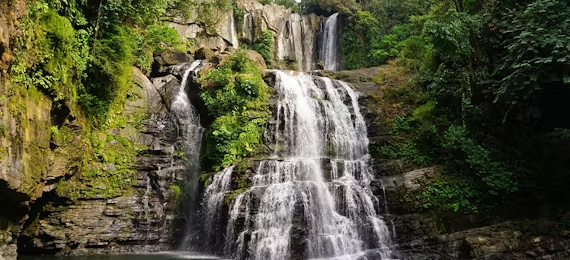
Immerse yourself in Manuel Antonio’s stunning natural beauty and thrilling activities on this 6-day adventure
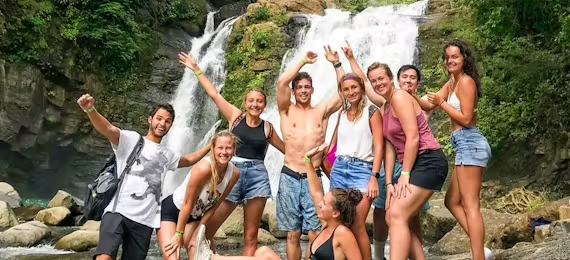
Embark on a full-day adventure exploring La Paz Waterfall Gardens, an animal sanctuary, and a Poas Volcano Tour, followed by a Coffee Farm experience.

Experience a comprehensive 6-day Mini Adventure, featuring Arenal Volcano, the Britt Coffee Tour, La Paz Waterfall Gardens, whitewater rafting, and a visit to the pristine Tortuga Island.
Spanish language lessons
No need to be fluent in Spanish to join the IVHQ Costa Rica program—but imagine how much more you can get out of your experience by learning some basic Spanish! Our tailored language lessons are designed to meet you at your current level and help you feel more confident in everyday conversations. Classes run Monday to Friday, and the best part? They’re super affordable and available exclusively for IVHQ volunteers. Dive deeper into the culture and make your experience truly unforgettable!
Online lessons:
- 1-hour Private Classes: US$75 (approximately AU$122) per week
San Jose Language Lessons:
- 2-hour Small Group Classes: US$158 (approximately AU$258) per week
- 1-hour Private Classes: US$207 (approximately AU$339) per week
- 2-hour Private Classes: US$402 (approximately AU$658) per week
Check what's required to visit Costa Rica
Safety and support
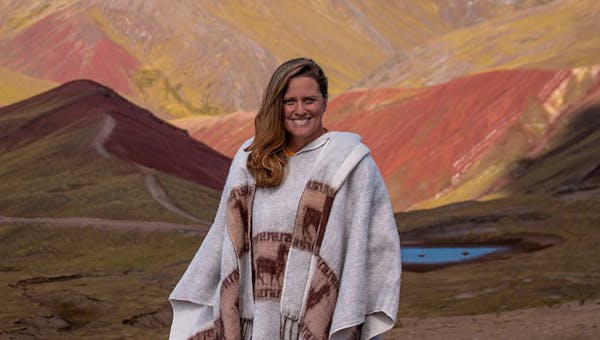
Safety and support
IVHQ follows best practice and industry-leading health and safety procedures, which are regularly reviewed and optimized as part of the B Corporation recertification.
- All volunteers encouraged to complete our interactive pre-departure training.
- All local teams trained on best practice volunteer management & First Aid.
- All IVHQ programs are required to adhere to IVHQ's Risk Management Policy.
- All volunteers have access to 24/7 in-country support from our local team.
Essential country information
Essential country information
| Capital | San Jose |
| Population | 5 million |
| Languages | Spanish |
| Currency | Costa Rican Colón (CRC) |
| Time zone | UTC−06:00 |
Weather and climate: Costa Rica is unequivocally a tropical country. Although you get much cooler temperatures in the mountains, the average annual temperature for most of the country lies between 71°F (21.7°C) and 81°F (27°C). The coolest months are from November through to January, and the warmest months are from March through to May. San Jose stands at approximately 1170 meters altitude and has a mean annual temperature of 69°F (20.6°C).
What recent volunteers said about their IVHQ experience
The program gave me a better perspective into my life and reawakened some capabilities I had forgotten about. My Spanish improved tremendously, as both host families spoke little English. Learning about how other cultures live is not always comfortable but it provides you with a better understanding about who you are as a person and how much we ALL have in common.
I gained this new sense of awareness of how living a humble life is rewarding in many ways. That locals and farmers genuinely find passion and love in their everyday life and work. Seeing this from an outside perspective brings joy and inspiration to do so in your own personal life. You will be challenged in your own ways, maybe adapting to a lifestyle, learning a new language, feeling a bit out of place, or missing familiar connections and conversation, but all of this is a part of self-growth and in the end, you will be proud of yourself.
My favourite part of volunteering was getting stuck in to the physical work of digging and raking paths for the coffee tours! My advice? Do it, you won't regret it at all! You'll learn so much about yourself, about the world and about different cultures.
To read all reviews, visit our reviews page.











































